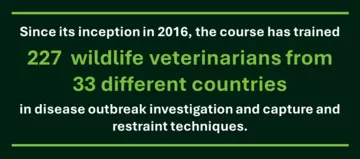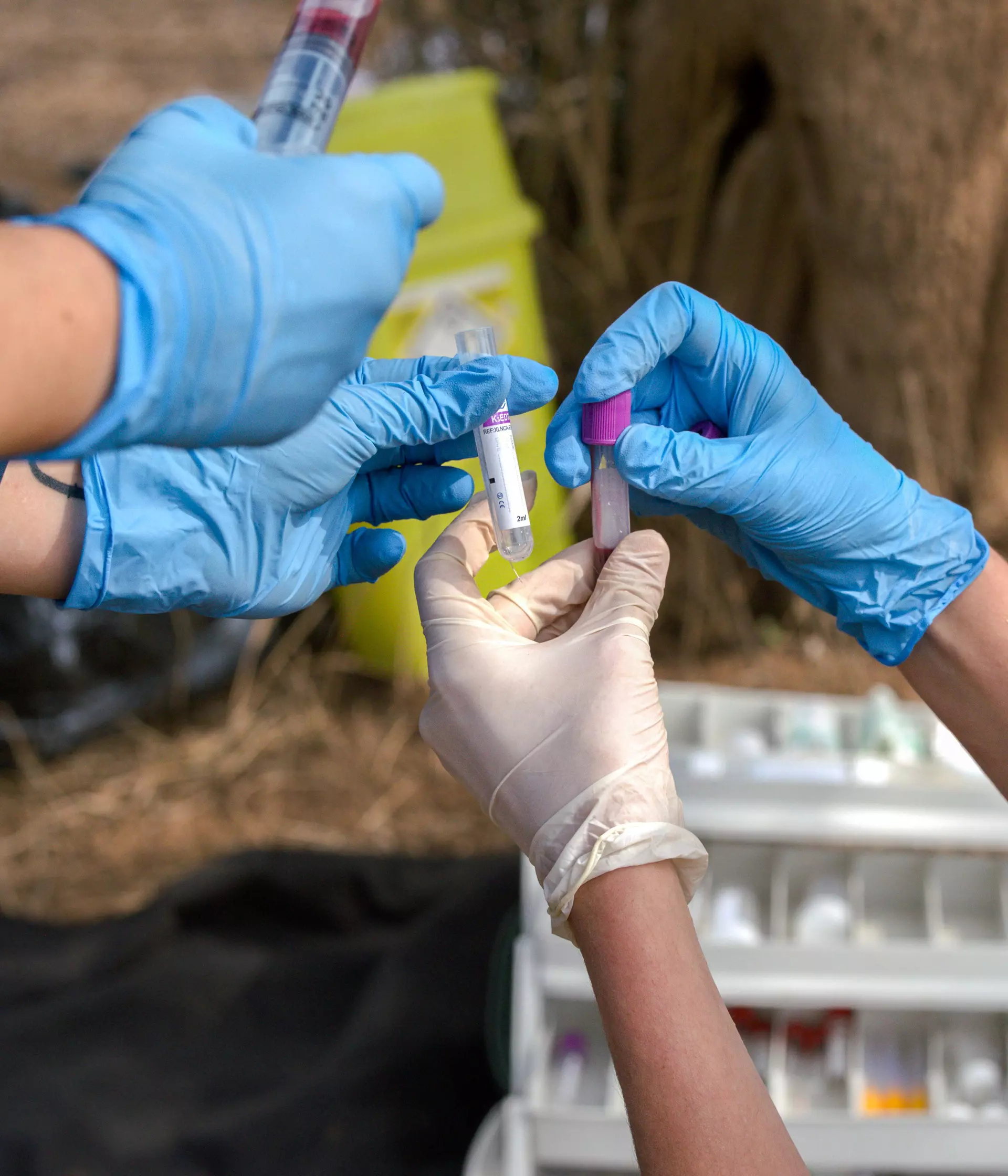
The Interventions in Wild Animal Health (IWAH) course is run jointly by ZSL and partners, bringing together wildlife vets from around the world to learn essential skills enabling them to effectively support conservation efforts in the field.
What skills do you need to be a wildlife vet?
During the three-week IWAH course, participants take part in practical sessions covering ecological survey techniques (such as sign surveys, camera traps, radio telemetry and distance sampling), disease outbreak investigation, in situ pathological examination, human-wildlife interface, wildlife forensics, and best practice wild animal restraint and anaesthesia techniques in the field. Sessions are led by tutors from the collaborating organisations involved in the course, providing a wealth of expertise and sharing their knowledge and skills.
We run IWAH alongside the Wildlife Institute of India, the University of Edinburgh, the Royal Veterinary College, the University of Melbourne, Toronto Zoo, the Wildlife Research and Training Institute and the Kenya Wildlife Service. The course is also a component of the Wildlife Health Bridge initiative, and an integral element of the online MVetSci course in Conservation Medicine awarded by the University of Edinburgh, providing practical knowledge to complement theoretical understanding.
“IWAH is a unique field training course in collaboration with well-known institutions worldwide.” says Dr Sonika B L, a project associate veterinarian at the Wildlife Institute of India, who attended the course in 2024 and is also a graduate of the MSc Wild Animal Health course run by ZSL and the Royal Veterinary College. “The course unequivocally highlighted the pivotal role of wildlife veterinarians in utilising their skills and knowledge for the health and conservation of wild animals.”
Wildlife vets and their role in conservation
In February 2024, a total of 24 veterinarians from seven countries (India, the Philippines, Australia, Spain, Portugal, Germany, and the UK) attended the field course at Sariska Tiger Reserve in Rajasthan, India. Fifteen vets were from India, many of whom work in some of the country’s National Parks or are involved in various conservation breeding programmes of endangered native species. One of these vets was Dr Anand V M, a veterinary officer at Bannerghatta Biological Park in Bengaluru. “I have learned a lot from this course” says Dr Anand, who works with several endangered species native to India, such as leopards and Bengal tigers. “It would be very helpful for me because I have recently joined a zoo, so all the things I have learned here I will use in coming days.”
The course helps train wildlife vets working across the globe, but by ensuring the involvement of local vets working in regions with high levels of biodiversity, this helps tackle the urgent need for more wildlife health professionals in these areas. One of the first veterinarians to attend the course in 2016 was Dr Yitawe Wungak. “I choose to attend the course to develop my capacity in wildlife diseases surveillance” says Dr Yitawe. “My experience was educating, engaging and memorable. I learned wildlife diseases surveillance and darting of wild animals.” Dr Yitawe currently works as a veterinary research fellow at the National Veterinary Research Institute, Nigeria.

Building a global wildlife vet community
The IWAH course now has an alumnus of over 200 vets from 33 different countries worldwide. Although historically the course has taken place in India, and with a focus on many Indian native species, the content taught is applicable for vets working all over the world. Dr Rebeca Grande Gómez, a graduate from the 2024 course, has found that the content she learned during the course is useful for her current role as a veterinarian working on Iberian lynx conservation in Spain. “This course offered the opportunity to have a real field experience with excellent professionals in a unique biodiverse area” comments Rebeca. “I learnt how to manage a wildlife mass mortality, wildlife forensics or crime with very real practices in the field. I can use this knowledge and skills now in my current or future jobs.”
Alongside the knowledge, skills and experience gained by participants, the course also provides a great opportunity for members of the global vet community to meet and engage with one another. “Honestly, my favourite part has been the people on the course” says Dr Dave Houston, an associate veterinarian working in Jersey, UK with Durrell Wildlife Conservation Trust, and a 2024 graduate of the IWAH course. “The skills and the knowledge that I've learned will absolutely come in massively useful...but I think looking back, the people that I have met, and just the stunning location as well, I think that will stay with me for a long time.”
Upon completion of the course, participants join an alumni community, known as the Wild Animal Alumni. This unique global network facilitates contact and information exchange between the Wildlife Health Bridge institutions and its graduates. It also allows members to stay in touch with one another and keep updated on the achievements of fellow graduates.
Wildlife vet training in Kenya
The previous courses have all taken place at Sariska Tiger Reserve in Rajasthan, India, but 2025 sees an exciting development as the course will be relocating to Naivasha in Kenya and gaining a new partner institution, the Wildlife Research and Training Institute.
The course will return to Sariska in 2026, with future courses predicted to alternate between the two locations from year to year. We are incredibly excited to be able to run the course in East Africa, with the hopes of being able to welcome more veterinarians from the African continent as we explore wildlife health and conservation topics in Kenya.
